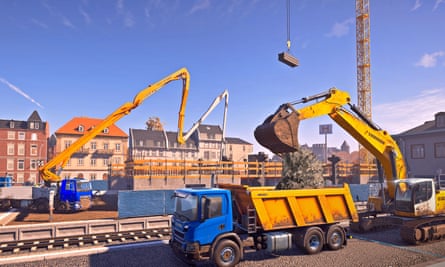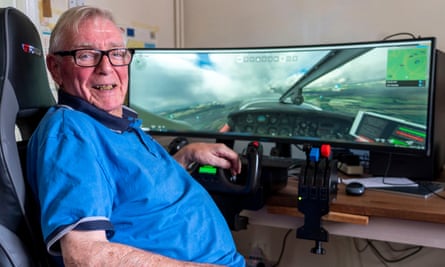The cliche about video games is that they’re all about escapism. When people switch on a PlayStation or souped-up PC, they do it to lose themselves in a mythical world or intergalactic conflict. They do not come here to power wash a patio.
But increasingly, that orthodoxy is being tested. The surging success of the job simulator, in which players take on seemingly mundane real-world careers, shows that our relationship with games is a lot more complex. Type “job sim” into the search window of PC digital games store Steam and a myriad of virtual employment opportunities open up. There are complex and accurate farming, beer brewing, bus driving, PC building, gas station managing and house selling sims, alongside the more recognisable flight and train options. And if you do want to jet wash a patio, there is PowerWash Simulator, which became such a viral hit on its release in July that it sold 3m copies within two months.
And if you think that everyone playing these sims is still engaging in a form of escapism, tapping into jobs they never attempted in real life, you’d be wrong. Some of the most ardent fans of job sims are people who do the jobs themselves: the literal busman’s holiday.
In the bedroom of retired army air dispatcher Frank Durrans, there is a powerful PC with an ultra-wide monitor and an array of complicated flight controllers. Stationed in Borneo during the Indonesian confrontation of the 1960s, he spent his military career in aircraft, dropping supplies for British troops stationed in the jungle along the Indonesia-Malaysia border. Now, every afternoon he uses Microsoft Flight Simulator and explores the skies in a turboprop aeroplane. “I mainly flew in old piston engines,” he says as he plays. “The Hastings and the Beverley, which was a huge aircraft. It could hold two 3 ton trucks, freight and 38 fully equipped troops. We dropped 24-hour rations every day, ammunition and water if required. We dropped live chicken and goats for the Gurkhas, because they had to kill their own food. We dropped cats to a Royal Marine DZ [drop zone] that was overrun with rats. There was nothing we couldn’t drop.”
He tells these tales as his Cessna 172 taxies on to the runway at Bournemouth airport. He wants to show me a nice route along the coast towards Cornwall, and all the while he talks about his experiences in the military; the game, with its astounding AI-driven recreation of the Earth’s surface and its simulation of the very feel of flight, seems to feed his memories. “It definitely reminds me of the pleasure of flying,” he says, as he swoops over Christchurch harbour. “I used to get such an adrenaline rush. Things would just happen. On one occasion, we took off from Kuching and an engine caught fire. I got on the intercom and the pilot shouted: ‘Empty the aircraft!’ We were having to throw cargo out of the door – these great big boxes. You never knew what was coming.”
Richard Evans is a train driver who has a hugely successful YouTube channel under the name Dad Rail – and he plays, yes, train simulators. Currently, it’s the excellent Train Sim World 3, which offers a variety of routes and a dynamic weather system. He started playing train sims when he was 12 and believes they gave him a pretty good grounding in what the career would entail. “Simulators are great for learning about the signalling and safety systems as well as general railway operations,” he says. “The big thing that it taught me was the level of concentration required. Load up a two-hour run and don’t move from the computer for the entire time. Don’t minimise the game to check social media, don’t get up to use the loo, don’t even change the view on the game to outside the cab. Sit there in cab view and complete the route, then do it over and over again.
“Earlier this year I was tasked with learning the route from Brighton to Eastbourne. This is a route that I have driven on Train Sim World a number of times. While you can’t learn the route fully on a simulator, what I had learned came in very useful when I went out in the cab of a real train: I had a rough idea of the route and the names of locations and speed limits.”
There is a social and investigative appeal for Evans too. “ I really enjoy driving routes and trains from around the world and learning about the operational differences. I have developed a particular fondness for German Railway through playing train sim and learning about the various safety systems and how things are done differently.”
“Through my live streams I have been able to connect with other railway staff from the UK and abroad, and we are able to share ideas and learn about each other’s railways and trains. It is very satisfying that as an English train driver I can jump into a German train and have a German train driver virtually instruct me through the game. I particularly enjoy driving routes and trains that I drive in real life, and comparing and contrasting the differences between the simulator and reality.”

Jacob Spence’s father was a master craftsman and housebuilder, and as a boy Jacob loved to visit his father on site, watching the heavy-equipment operators at work. Later, he worked with his dad, learning every aspect of the building trade and eventually operating those heavy machines himself. He now also works in education, researching simulation training platforms. And he plays Construction Simulator. “I recently beta-tested the upcoming release of the game. While operating a large Caterpillar 349F excavator, I took notice of realistic details like the heavy feel of the machine, real engine and hydraulic sounds, and realistic range and speed of machine component movements. I’m very excited to spend more time seeing how the earthwork system has evolved, as the excavation system Weltenbauer authored for Construction Simulator in 2015 continues to stand out to this day.”
Like Evans, Spence has used the game as a learning tool (indeed, its developer Weltenbauer also makes industry training software), using its twin joystick setup to learn unfamiliar control set-ups in new equipment. And he too sees the social value of the games. “The diverse community of players, some of whom are real-life operating engineers, learn a great deal from each other simply by sharing their knowledge, life experiences and game-play. Player connections and multiplayer sessions are supported via a Discord community run by the game’s publisher, Astragon.”
I ask Spence’s colleague Josh Miller about the game – this is a guy who has built ocean jetties, backfilled Texas oilfield pits and worked at the world’s largest single pit mine, Bingham Canyon. But the first time he ever saw a Liebherr drilling rig, which he would later work with in real life, was in Construction Simulator 2015. He too loves the multiplayer element of the game, working on sites with other fans. “The game allows for time and enjoyment,” he says. “No deadlines, no angry boss, just enjoying the machines and friends. The community is a big part of it, working together as a team. Real dirt work is like this, in everyday situations […] It’s funny and we laugh. There is a lot to be said about laughter at work or in the game.”
So people play simulations of their own jobs for social and educational reasons; they do it to expand their knowledge and experience of roles they enjoy. But there is also something else: these sims are about nostalgia and reconnection; they remind players about what motivated them in the first place. “Construction Simulator brings back memories of working with my father, particularly the beginning of classic CS when working in the village area with that old flatbed truck,” says Spence.
“My father drove an old 1986 Toyota truck, which he converted into a flatbed when the bed rusted away and re-supported when the main frame rotted through. He used all of his tools until they failed and never wasted any materials. He had a true way with all things physical and mechanical, which allowed him to work across many trades as a builder. I have always struggled to understand how he did what he did and I was amazed every day that I worked with him. Those are days I will never forget.”

Whatever we think about our jobs they are part of our identities, and if we are lucky enough to be in jobs we like and that last they form the framework of our lives. I think playing job sims is like listening to records that we loved as teenagers: they take us back. They reignite formative moments. Durrans, who once flew over the jungles of Borneo, over Singapore, throughout the far east, is in his 80s now, and as he loops over Bournemouth airport at the end of our little trip, I ask about what flying means to him these days.
“My pleasure is in navigating,’ he says. “I like to find my way and get into a position that’s perfect for landing without too much repositioning. One of my favourite things was flying from Berlin to the Scandinavian countries and then down through Holland and over Frankfurt – it was fascinating. I enjoy being up there; it keeps the mind active. I was ill for a while after an operation and PC Pilot magazine suggested some routes over Australia – they were wonderful, two hours of lovely sightseeing: Sydney harbour, the Great Barrier Reef …
“I do a flight every day. I shall never give it up.”

Be the first to comment